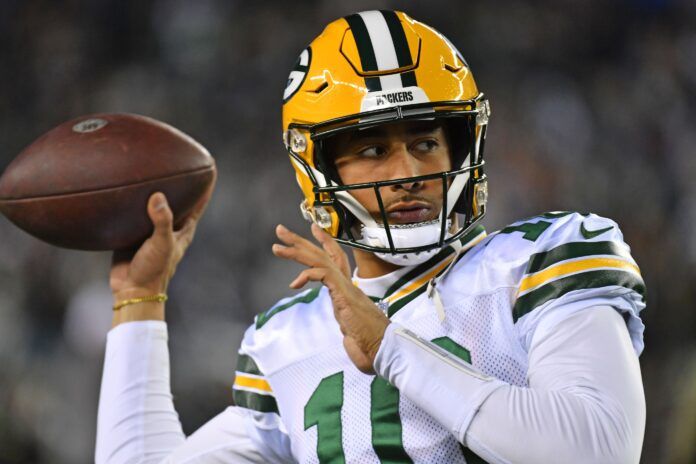The Green Bay Packers and Aaron Rodgers appear on course to finally divorce this offseason as the quarterback announced Wednesday he intends to play for the New York Jets in the 2023 season. With Rodgers set to depart Green Bay, the Packers will most likely turn over their offense to Jordan Love, who’s been sitting on the bench awaiting his turn under center since being selected in the first round of the 2020 draft.
The Jordan Love Era Begins for the Green Bay Packers
If you ask the Packers’ front office, they’re excited about the prospect of leaning into Love for the 2023 campaign. Speaking at the NFL Combine, Green Bay general manager Brian Gutekunst was positive about Love’s upside.
“We’re excited about him,” Gutekunst said. “I think I’ve expressed to a lot of people that he needs to play. That’s the next step in his progression. He needs to play. Jordan’s done a great job working hard, so he’s doing everything we’re asking.
“We took him for a reason back in 2020. He’s been progressing nicely, and to see him kind of take the jump he did this past year was nice. Again, it’s much different than going out there week in, week out, taking on the challenges when teams are game planning for you.”
Love’s development has largely taken place on the Packers’ practice fields because he hasn’t had much of a chance to show his advancement in live-game action.
Love made one start in 2021 when Rodgers was diagnosed with COVID-19. Facing the Kansas City Chiefs, Love completed just 19 of 34 passes for 190 yards, one touchdown, and one interception in a 13-7 loss. Packers head coach Matt LaFleur took blame for the defeat and Love’s performance, citing the lack of time to implement a Love-friendly game plan.
In 2022, Love didn’t start any games and attempted just 21 passes all year long. He completed six of nine attempts for 113 yards against the Philadelphia Eagles in Week 12, but more than half that yardage came on a 63-yard slant to Christian Watson.
Love hasn’t been a full-time starter since 2019 when he threw 20 touchdowns against 17 interceptions for Utah State. He was better in 2018, completing 64% of his passes for 9.4 yards per attempt, 32 touchdowns, and six interceptions.
In his pre-draft scouting report, Pro Football Network’s Tony Pauline labeled Love an “athletic passer with a strong arm” but noted the ex-Aggie needed to improve his speed and decision-making in the pocket.
For now, Love is still a virtual unknown at the NFL level. But he’s shown enough promise — at least behind the scenes — to give the Packers confidence in him as their long-term starter.
What Can the Packers Do in Free Agency?
Last season marked the first time in four years that the Packers had not won 13 games and the NFC North crown. The rest of the division is improving, and Green Bay won’t be the betting favorite, but the Packers still have enough talent to compete for the title or secure a Wild Card berth.
Green Bay restructured several veteran contracts in advance of free agency to give themselves nearly $25 million to work with. Rodgers’ dead money, when it comes, will eat into that total, but the Packers will have some room to find impact players on the open market.
On the offensive side of the ball, Green Bay could stand to give Love another pass catcher. It’s unclear if Gutekunst and Co. are willing to pay the $12+ million it might take to land Odell Beckham Jr., but DJ Chark or Parris Campbell could make sense as lower-cost additions that would fit with Watson and fellow second-year wide receiver Romeo Doubs.
If the Packers don’t want to get into the WR market, they could attack the free agent tight end class. Evan Engram is already off the board after being franchise-tagged by the Jacksonville Jaguars, but Dalton Schultz and Mike Gesicki are still available. Schultz would give Green Bay an in-line option, while Gesicki is more of a wide receiver in a tight end’s body.
The Packers’ offensive line probably already has enough depth, but Green Bay could use some of its cap space on the other side of the ball. Adrian Amos is a free agent and might leave a hole at safety next to Darnell Savage, while the Packers also need more depth along the interior of their defensive line, where Dean Lowry remains a free agent.
How Does Love’s Contract Work?
Love is entering the final year of his rookie contract, but the Packers have to decide on his fifth-year option by May 1, 2023.
The fifth-year option is based on the average of the third- to 25th-highest salaries at the player’s position over the past five seasons. A player’s fifth-year option can increase if he meets certain playtime thresholds or makes Pro Bowls, but none of those considerations apply to Love. Thus, his 2024 fifth-year option is projected to cost $20.272 million.
That salary creates a bit of risk because, under the NFL’s most recent collective bargaining agreement, fifth-year option salaries are fully guaranteed. The Packers would be opting into a $20+ million salary for a player with an extremely limited track record, but that figure would represent a bargain if Love is even a league-average quarterback in 2023.
Alternatively, Green Bay could decline Love’s option and be willing to use the franchise tag in 2024 if Love plays well. But the 2024 franchise tender is projected to be worth more than $40 million.
Picking up Love’s option would protect the Packers against his salary doubling in 2024, and it would also send a message to the club’s roster that Love will be Green Bay’s quarterback for the foreseeable future.

